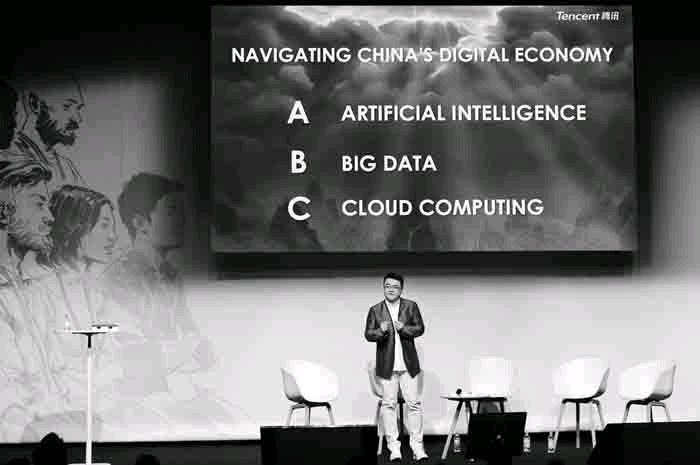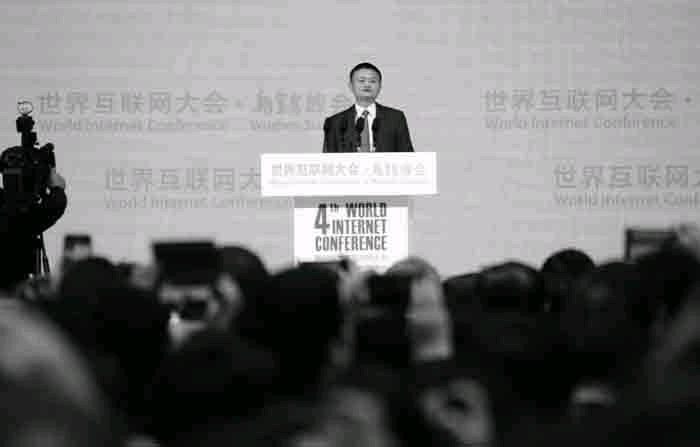China’s Digital Economy Rank Sec ond Globally
Chinas digital economy reached 22.58 trillion yuan ($3.4 trillion) in 2016, ranking second globally and accounting for 30.3 percent of the national GDP, according to reports issued Monday at the ongoing fourth World Internet Conference(WIC) in the east China town of Wuzhen. The two reports, which cover the development of the internet around the world and in China respectively, said 22 percent of the worlds current GDP is closely related to digital economy that includes techniques and capital.
As of June 2017, there were 3.89 billion internet users around the world, of which 751 million were in China, the most of any country worldwide, said the reports. Compiled by a group of parties led by the Chinese Academy of Cyberspace Studies (CACS), the reports cover major areas of internet development, including information infrastructure in China and abroad, online information technology, online security, digital economy, amongst others. Indexes were also issued at the conference to assess and compare the development of the internet in 38 major countries and emerging economies in the world. In the future, the reports will be issued annually at the WIC, according to Yang Shuzhen, president of the CACS.
The fourth WIC, which runs from Sunday to Tuesday, has the theme “Developing digital economy for openness and shared benefits - building a community of common future in cyberspace.”China and Russia will enhance cooperation on digital economy, including big data, the Internet of Things and smart cities, Chinese Ambassador to Russia Li Hui told Xinhua in a recent interview. While making continuous efforts to strengthen bilateral cooperation in the sectors of energy, equipment manufacturing, agriculture and spaceflight, the two countries are eyeing digital economy as a new area of cooperation, Li said. China and Russia will also continue their efforts to achieve substantial results from the alignment of the Chinaproposed Belt and Road Initiative and development programs within the Eurasian Economic Union (EEU) led by Russia.
The Belt and Road Initiative, proposed by China in 2013, aims to build trade and infrastructure networks connecting Asia with Europe and Africa on and beyond the ancient Silk Road routes. It comprises the Silk Road Economic Belt and the 21st Century Maritime Silk Road. The EEU, which groups Armenia, Belarus, Kazakhstan, Kyrgyzstan and Russia, is an economic bloc aiming to optimize the flow of goods and services among its members. Li said China and Russia will work to implement the project of an international transportation corridor in the Far East and jointly explore the Arctic shipping route to make it a “silk road on ice.”
According to him, strategic mutual trust between the two countries is strengthening, while political, economic and people-to-people exchanges are developing robustly, forming a solid base for the China-Russia comprehensive strategic partnership of coordination. The partnership plays a special role in Chinas “major-country diplomacy”with Chinese characteristics and both countries will never waver in their deter- mination to develop such a partnership no matter how the international and regional situations change, Li said.
Both China and Russia are permanent members of the United Nations Security Council and important parties of the G20, BRICS and the Shanghai Cooperation Organization (SCO), Li said, adding that the two countries share similar positions on many international affairs. “I believe as long as we keep up with the times and seize the opportunities, China-Russia relations will be very productive,” the ambassador said. Next week, the 16th meeting of the Council of Heads of Government (Prime Ministers) of the SCO will be held in Russias Black Sea resort of Sochi. In Lis view, the SCO adheres to its founding values or the “Shanghai Spirit” featuring mutual trust, mutual benefit, equality, consultation, respect for cultural diversity and pursuit of common development.
At the Astana summit in Kazakhstan in June, India and Pakistan completed their accession to the SCO, which also groups China, Russia, Kazakhstan, Kyrgyzstan, Tajikistan and Uzbekistan. After the expansion, the SCO covers about 44 percent of the worlds population and over a fifth of the worlds gross domestic product (GDP). The SCO members have shown a strong will to cooperate in various sectors in the SCO framework, and the Belt and Road Initiative will create new economic propellers for the SCO members and contribute to regional prosperity against a backdrop of globalization, said Li.
The rapid growth of financial technology, AI, big data, cloud computing, block-chain and search engines in recent years have enabled capital investors and providers to connect more closely and easily with other players, and given rise to new types of financial activities. It has made it easier for small and microsized enterprises to get loans at lower interest rates, making financing more inclusive and mutually beneficial. But the problems and risks it has created also pose a new challenge to regulators.
The diverse forms of financial innovation are fine. Yet the unlawful acts these forms of innovation can cover because of their sophisticated nature are very difficult for regulators to detect. The risks include data security problems such as data fraud and leakage, credit risks brought about by information asymmetry owing to insufficient information disclosure by business owners. Financial technology should help solve the problem of information asymmetry, by providing detailed information on every aspect of business that will help determine the prices of financial assets and reflect the credit risks. Thats why the importance of traceability in such information is greater than the pure statistics of big data.
Many P2P (peer-to-peer) platform owners cannot be held accountable even after breaking the law because the information they disclose to start their businesses is not sufficient enough to bring them to justice. If the regulators cannot find the loopholes and plug them in the early stages, investors may continue to incur losses, soiling the reputation of the industry. Besides, many traditional financial risks have escalated because of the development of new technologies, which the regulators need to curb through targeted measures.
The rapidly growing information and communications technology (ICT) has become an integral part of production and peoples day-to-day activities, as well as the driving force of global development and economic planning. The changes are reflected in three aspects. First, ICT has changed the nature of commercial activities. The consump- tion pattern and enterprises operation mode have fundamentally changed, and now the effective combination of the eeconomy and the real economy will lead to more revolutionary innovations that will have a greater impact on peoples lifestyles.
Second, the change in the industrial manufacturing pattern over the past three decades, especially outsourcing by big enterprises, has reshaped the international industrial order, and China has become a hub of this change. And new combinations of ICT and industrialization such as the “Made in China 2025”strategy and Industry 4.0 will make the industrial sector even more intelligent.
Third, the change in the financial system, thanks to ICTs development, has made trade in the financial industry, even the entire economy, more convenient and created a huge space for the e-economy to develop amid new opportunities and challenges.
Making China a great cyber power has already been made a national strategy. Its aim is to broaden the coverage of network infrastructure, facilitate comprehensive development of the eeconomy and safeguard the internet. And these efforts will definitely fuel the transformation and upgrading of the Chinese economy. China is willing to deepen global cooperation in the digital economy to gain new momentum and expand global economic growth, the head of the countrys internet regulatory body said on Monday.
Xu Lin, minister of the Cyberspace Administration of China, reiterated that China would further open its economy and would work with other countries to develop an integrated global digital market with mutual benefits. “We will actively implement the G20 Digital Economy Development and Cooperation Initiative and deepen international cooperation related to the Belt and Road Initiative,” Xu said at the 4th World Internet Conference. According to Xu, countries should strengthen co- operation in policy making and regulation on network facilities, information technology, cross-border e-commerce, data distribution and other digital related fields to build a fair and efficient governance system. “Working together, we should deepen global cooperation on cybersecurity, strengthen data protection and combat crimes in the field of digital economy,” Xu said.
Digital economy is playing an increasingly significant part in driving Chinas economic growth. The size of Chinas digital economy hit 22 trillion yuan ($3.3 trillion) in 2016, accounting for 30 percent of the countrys gross domestic product. Yuan Jiajun, governor of Zhejiang province, said the digital economy is also increasingly becoming a key driver to boost global economic development. “The digital economy is experiencing a new phase of high growth, and is projected to be worth $16 trillion in China by 2035,” Yuan added.
Seeing the big potential, the Chinese government has attached great importance to the development of the digital economy and introduced a wide range of strategies and operations, including the national IT development strategy, the national big data strategy and the “Internet Plus” action plan.Statistics from the China Internet Network Information Center back up this internet boom. By June this year, the country had about 750 million netizens, accounting for one-fifth of the global total. “To promote and support the development of the digital economy, it is necessary for global leaders, governments, related industries and academia to reach a consensus,” said Wang Binying, deputy director-general of the World Intellectual Property Organization. She added that the digital economy will accelerate transformation and upgrading in various industries, and have a huge impact on peoples daily life.
Zhang Yong, CEO of Chinese ecommerce giant Alibaba Group Holding Ltd, agreed, saying the integration of the digital and real economies offers a promising blueprint for future development.
“It offers enormous opportunities for China to catch up with leading countries,” he said. Pony Ma, founder of Tencent, said Thursday that the digital economy has become a major force in Chinas economy. Speaking at the China International Digital Economy Summit 2017 in Shijiazhuang, capital of Hebei province, Ma said Chinas digital transition will impact on global policy on digitalization in addition to the significance to the Chinese economy.
Chinas digital economy reached 22.6 trillion yuan ($3.4 trillion) in 2016, over 30 percent of the countrys GDP. The volume is expected to further expand in 2017, Ma said, adding the digital economy has become a core engine that drives Chinas economic growth. Ma said his company would set up a finance technology laboratory in Xiongan New Area, and help the area with big data support. The share prices of internet giants Tencent, Alibaba and Baidu have risen to great extent. This year, Tencents share price has more than doubled, with the total market value reaching HK$4 trillion. Tencents fiscal report released last week showed thirdquarter revenue went up 61 percent year on year to 65 billion yuan. The company recorded strong growth in games, digital content, online advertising and payment related services.
China has become the worlds largest B2C (business-to-consumer) ecommerce market, accounting for more than 40 percent of the world total, compared with just 1 percent about one decade ago. China is also among the top three countries in terms of attracting venture capital investment in key emerging digital technologies, such as virtual reality, autonomous vehicles, 3-D printing, robotics, drones and artificial intelligence. Chinas digital economy and internet-plus strategy have had a fourfold impact.
First, Chinas new digital economy is part of the worlds gigantic new market in terms of selling products and services not only to Chinese consumers via B2C e-commerce, but also to Chinese companies via B2B (businessto-business) cross-border e-commerce. The latter is expected to grow even faster and become at least five times the size of cross-border B2C e-commerce by 2020.
Second, Chinas rise as a digital leader of innovation has made it a driving force for further development of global innovation networks. It is now leading the march for co-creation of new core technologies and new business models, which in turn will create new opportunities for researchers, enterprises and governments around the world. As Steve Jobs, co-founder and former CEO of Apple, said: “Innovation distinguishes between a leader and a follower”.
Third, starting as a low middleincome country, Chinas experiences might be relevant and useful for other developing countries that plan to get onto the fast track to digital economy. For example, China has created the space for new e-payment methods for those who dont have credit cards, and made it easier for small business owners to get preferential loans.
Fourth, Chinese regulators have lagged behind some advanced countries in making rules which in a way helped new businesses to grow. But today it has become necessary to set rules and regulate cooperation both at home and at the international level. For instance, with many big companies holding monopoly positions in the digital market, regulators need to discuss and decide how to prevent unfair competition and compromising of public objectives. And with the unthinkable rate of growth in data online and cross-border data flows, we need more in-depth studies and cooperation on data security, privacy protection and the fight against cyber crimes.
China can and should be an active player in this field.
- 中国经贸聚焦·英文版的其它文章
- Latest Public Official Changes in China
- Exhibitions
- Liu Beixian Former Head of Chinese News Agency Expelled From Party for Graft
- Deng Weigen Former Mayor of Jiangmen,Guangdong under Investigation
- Ni Zhimao PhD student at Peking University act as Deputy Governor of Yuyang
- Qiao Baoping Former Chairman of Guodian Corporation act as Chairman of Na tional Energy Investment Group

